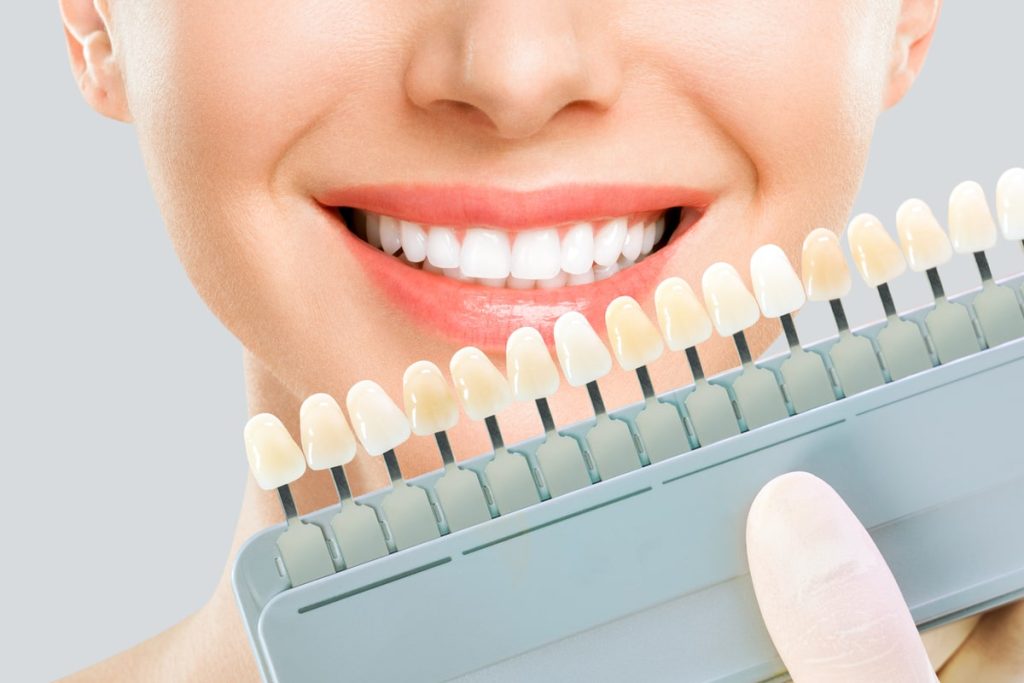July 19, 2024
Dr. Andres de Cardenas
All-on-4 dental implants, cosmetic bonding, Cosmetic Dental Care Services, cosmetic dentist Miami, Cosmetic Dentist Whitening, Cosmetic Dentistry, Daily Health Tips, dental care, Dental Care Tips, Dental Cleaning Appointment, Dental Implant Procedure, dental solutions, Dentist Appointment, family dental Care dentist, Family Dentist, FL, healthy teeth, Natural teeth whitening, Oral Cancer, Oral Care, professional denstists, Smile Makeover, Teeth Alignment, Teeth discoloration, Teeth Whitening, teeth whitening sensitive teeth, The Miami Cosmetic Dentist
Family Dental Care Miami | Miami Cosmetic Dentist > Blog > bridges > Which Procedure Is Right For You? Veneers Vs Dental Crowns
Which Procedure Is Right For You? Veneers Vs Dental Crowns

A bright, confident smile can transform your everyday life. If your teeth need a little extra help, modern dentistry has a plethora of options. Dental veneers and crowns are two popular procedures. However, people often get confused when choosing between them because they serve similar purposes.
Dental veneers are thin, custom-made shells of tooth-colored materials designed to cover the front surface of teeth. These shells are bonded to the front of the teeth, enhancing shape, size, color, and overall appearance. A dental crown is a tooth-shaped “cap” that covers the entire tooth, restoring its shape, size, strength, and appearance. It can protect a weakened tooth from breaking or holding together a cracked tooth.
Understanding their differences, advantages, and disadvantages can help you decide which procedure is right for you.
 What’s The Down-Low On Veneers And Crowns?
What’s The Down-Low On Veneers And Crowns?
First things first, let’s clear up what exactly we mean by veneers and crowns. In essence, both are means of improving your teeth’ appearance (and sometimes health). They can help correct various cosmetic problems, and choosing between them essentially boils down to assessing your specific needs.
1. Dental Veneers
Veneers are thin porcelain shells attached to the front of your teeth. They are custom-made to match your natural teeth’ shape, size, and color. Veneers are excellent for aesthetically enhancing your smile; they treat dental problems like stains, gaps, or mildly crooked teeth flawlessly. The procedure is less invasive than crowns and helps maintain more of your natural tooth structure.
2. Dental Crowns
Crowns, on the other hand, are like a ‘cap’ for your teeth. They cover the entire tooth surface, improving its shape, size, and strength. A dental crown is the solution if you have a broken tooth or have undergone a large filling or root canal treatment. They provide structural support and can enhance your smile, too.
Crowns provide a solution for more severe problems, while veneers complement your dental aesthetics. The choice between a veneer or crown depends on the suitability of your unique situation and the state of your tooth.
Veneers Vs. Crowns — The Core Differences
With myriad options amidst dental restoration techniques, the competition between veneers and crowns stands out. Isn’t it time to settle the age-old question: Should you opt for a crown or a veneer?
Dental crowns entirely cover the compromised tooth, restoring the dental structure and functionality. This dental treatment, involving enamel shaping and temporary crown fitting, is often recommended after a root canal or to address severe decay. The process ensures the crown fits snugly over the entire tooth, adding longevity and durability.
Conversely, dental veneers are more of a cosmetic dentist’s ally. Made of porcelain, veneers cover the front surface of your front teeth. The veneer application, which is relatively less invasive, conserves tooth structure. This porcelain veneer essentially transforms the appearance of your front teeth and hides stains, gaps, or minor chips.
So, when would a dentist recommend crowns and veneers?
If durability wins over aesthetics for you, a crown may be advised. Crowns are a sturdy solution, especially following a root canal treatment with compromised tooth structure.
Conversely, veneers, being highly aesthetic dental restoration, could be your go-to for a smile upgrade. They’re predominantly used for the front teeth, offering less durability than a crown but a more comfortable improvement to the appearance.
Pros And Cons Of Dental Crowns And Veneers
Veneers and crowns often come to mind when your smile needs a boost. Both ‘dental veneers’ and ‘dental crowns’ are versatile ‘dental restoration’ options with unique pros and cons.
1. Dental Veneers
Usually ‘made of porcelain,’ veneers are placed to ‘cover the front surface’ of ‘front teeth’ to ‘improve the appearance.’
- Pros: Veneers provide a natural look, effectively correcting color and shape. They are less invasive, preserving more of the ‘tooth structure’, and are stain resistant, providing a long-lasting gleam to your smile.
- Cons: Veneers are irreversible – once a layer of ‘enamel’ is removed for placement, there’s no turning back. You might experience potential sensitivity post-‘dental treatment’, too. Also, not all ‘dental insurance’ plans cover veneers, which can lead to out-of-pocket costs.
2. Dental Crowns
A ‘crown’ encases the ‘entire tooth,’ ideal for teeth with decay or after a ‘root canal.’ ‘Porcelain fused’ crowns are popular due to their natural appearance.
- Pros: Apart from the aesthetic improvement, crowns enhance tooth functionality. This ‘dental crown’ procedure is customizable and longer-lasting than a ‘veneer or crown’.
- Cons: Crowns require more extensive tooth reshaping, often mirrored at a higher cost. The need for a ‘temporary crown’ during the procedure might also add to the inconvenience.
When May a Dentist Recommend a Veneer or Crown?
Veneers can help beautify with finesse. Being thin layers applied to the front surface of your tooth, veneers address aesthetic concerns like discoloration, minor chips, or uneven teeth. They improve the appearance of your front teeth, reviving your smile’s charm. Veneers may be the first recommendation for these cosmetic enhancements, owing to their non-invasive nature and natural appearance.
Dental Veneers can be recommended when there is a need to improve the aesthetics of a patient’s smile, specifically in cases of:
- Discolored teeth: where the staining can’t be treated with regular whitening methods.
- Chipped, cracked, or broken teeth: veneers can cover these imperfections without requiring extensive dental work.
- Slightly misaligned or gappy teeth: veneers can bring uniformity to the teeth’s appearance.
Contrarily, tooth crowns rule the restorative kingdom. A dental crown covers the actual tooth, restoring its function and form. Crowns are typically used for damaged teeth, particularly post root canal or severe decay, where erosion has compromised tooth strength.
Also, crowns can help secure dental implants, preserving natural teeth’ structure and function. On the other hand, a dental crown might be the suitable option in the following cases:
- Decayed or weakened teeth: Crowns are often used when a large cavity threatens the health of a tooth
- Severely worn or broken teeth: A crown can easily restore the shape and function of the tooth.
- Following a root canal treatment: After a root canal, a crown is typically placed over the tooth to seal it and prevent it from fracture.
Please consult your dentist to determine which procedure best suits your needs.
The cost of veneers and crowns can vary, and the right choice revolves around your unique situation. For purely aesthetic changes, veneers might win the match. However, a dental crown may take the trophy home for extensive tooth damage, demanding aesthetic and functional correction.
 Making Your Choice — Crowns or Veneers?
Making Your Choice — Crowns or Veneers?
When deciding between veneers and crowns, consider the condition of your teeth, oral habits, aesthetic goals, and budget. If your teeth are significantly damaged or decayed, crowns might be the best route. Conversely, veneers could be the answer if you’re looking for a less invasive cosmetic upgrade.
An essential step in determining “dental veneers vs crowns” is consulting with your dentist. They can evaluate your existing teeth’s natural health and recommend veneers if you need only aesthetic improvements or a dental crown if the tooth needs fortifying. It’s in understanding the difference between veneers and crowns’ uses that your choice becomes clearer.
Your dentist is the best person to help you make the final decision. It often comes down to the condition of your tooth, your aesthetic preferences, and your budget. A veneer might be a suitable solution for a cosmetic tweak, while dental crowns are ideal for extensive restorations.
Regular dental check-ups and proper dental hygiene could prevent most problems that require these treatments. However, if you’re currently facing an issue that might need one, we hope this comparison of veneers and dental crowns helps guide your decision on the road to a bright, confident smile.
Your smile is unique, and so are your dental needs.
Get the Smile you Deserve!
Seek out the best cosmetic dentist, Dr. Andres de Cardenas, and call us today!
Call Dr. Andres de Cardenas today at 305-251-3334!
Cosmetic dentistry offers many options for people who are unhappy with the appearance of their smile. If you’re one of these people, we encourage you to seek out the veneers, cosmetic dentistry in Miami.
Get In Touch With Us
Recent Posts
- Bright Smiles, Brighter Futures: Why Cosmetic Dentist Whitening Is Worth It
- Safeguard Your Smile: Family Dental Care Dentist Debunks DIY Dentistry Tips!
- Dental Implant FAQs: What to Know About the Recovery Process
- The Health Benefits Of Cosmetic Dental Care Services: Beyond Vanity
- The Ultimate Cosmetic Dental Checklist For Miami, FL Residents
Related articles
July 5, 2024
Dr. Andres de Cardenas
All-on-4 dental implants, cosmetic bonding, Cosmetic Dental Care Services, cosmetic dentist Miami, Cosmetic Dentistry, Daily Health Tips, dental care, Dental Care Tips, Dental Cleaning Appointment, Dental Implant Procedure, dental implant recovery, dental implants, dental solutions, Dentist Appointment, family dental Care dentist, Family Dentist, FL, healthy teeth, Oral Cancer, Oral Care, professional denstists, Smile Makeover, Teeth Alignment, Teeth discoloration, Teeth Whitening, The Miami Cosmetic Dentist
Safeguard Your Smile: Family Dental Care Dentist Debunks DIY Dentistry Tips!
June 21, 2024
Dr. Andres de Cardenas
All-on-4 dental implants, cosmetic bonding, Cosmetic Dental Care Services, cosmetic dentist Miami, Cosmetic Dentistry, Daily Health Tips, dental care, Dental Care Tips, Dental Cleaning Appointment, Dental Implant Procedure, dental implant recovery, dental implants, dental solutions, Dentist Appointment, Family Dentist, FL, healthy teeth, Oral Cancer, Oral Care, professional denstists, Smile Makeover, Teeth Alignment, Teeth discoloration, Teeth Whitening, The Miami Cosmetic Dentist


